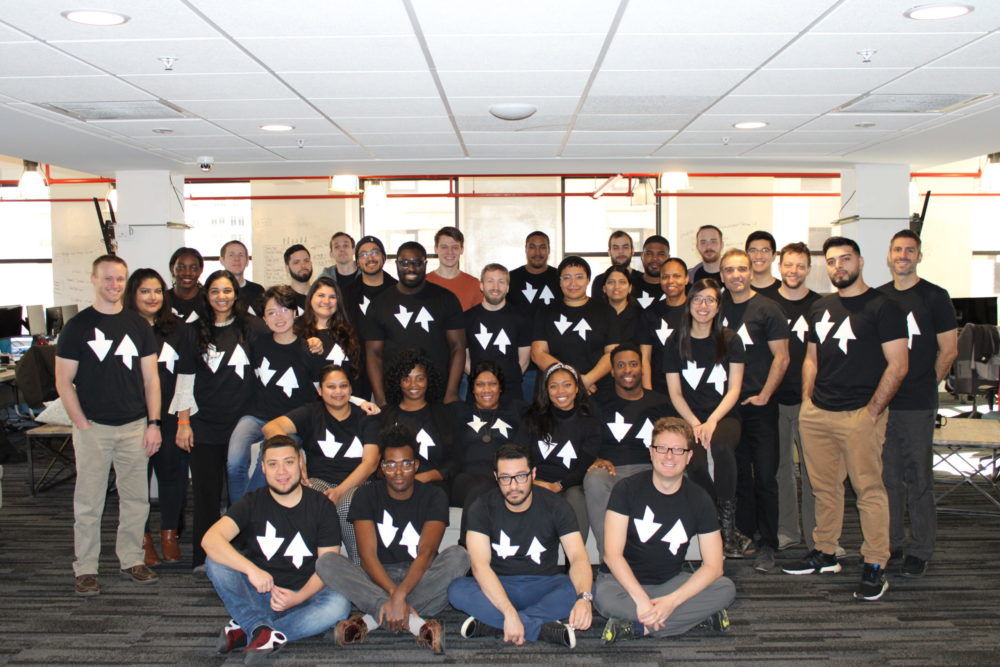After 11 years as a physics teacher, Joshua Gates was burnt out.
“With teaching, you never quite feel like you’re on top of it all,” he told Technical.ly. “You have responsibilities to the kids, the parents, colleagues and administrators and and that takes a toll on you — and it’s not as rewarded as it should be.”
Coding had long been an interest of the January 2020 graduate of Zip Code Wilmington, the nonprofit bootcamp based downtown at The Mill. He had been the director of innovations at a private day school in New Castle County, creating curriculum with its innovation and design labs, and he did some coding for in-house projects. He even created an online gradebook that had drawn quite a few teachers as subscribers — something that made him a bit of money on the side thanks to some basic coding skills.
Gates first realized that a full pivot into tech was a real possibility when a local software developer came to talk to the school’s coding club he sponsored.
“He talked to them about Java, robot programming and then about Zip Code a little bit,” he said. “He was talking to [the students], but I was listening. I thought that was an amazing opportunity, and if I was ever going to quit an established career, that was the way to go.”
When he finally decided he was ready to make the change, he considered for-profit, online coding schools because of the convenience. Zip Code’s cohorts are in the spring and fall, and he would have to commit to leaving his teaching job to join. Completing an online course during summer break would be easier.
But he did his research, weighed his options, and ultimately decided that Zip Code’s additional offerings such as interview prep, connections to potential employers and a lower cost made it his best option — “better than everything out there.”

It’s a gamble to pivot to a new career. But tech, with its competitive — and apparently ever-growing — salaries and endless demand for new workers, remains a good bet. Case in point: In Delaware, the average salary for computer and mathematics workers as of May 2020 was a cool $99,350, per data from the U.S. Bureau of Labor and Statistics. (The industry has also proven to be relatively pandemic proof.)
Gates started preparing about two years ahead to make sure that his family — he’s married with a 12-year-old — wouldn’t be negatively affected by three months-plus with no income from his end. They began putting away money, planning for a potential six months or more of no income.
And, again, timing: Gates applied for the cohort that began in October 2019. He didn’t know he was accepted until July. But he had to tell his employer he wasn’t coming back in the fall by February.
“At that point, it was a little bit of a leap of faith,” he said. Just in case, that summer he started networking and applied for a few jobs. “I got exactly one interview, despite the fact that I had made a website that I was making money from,” he said. “I got to the second round and they were like, ‘You have potential, but it looks like you’re self taught.'”
When the cohort finally started in October, it took some adjustment at home.
“[My wife and I] definitely needed a team approach because I was fairly absent for three months,” Gates said. “When they tell you it’s going to take 80 to 100 hours a week, they’re not kidding. They try to drive it home, and not everyone believes it, but it’s really true. You definitely have to put everything else aside. Don’t even think about working. Family stuff, you tend to be absent from, too, more or less. You can make the time for really important stuff, but you’re doing it all day every day.”
Ultimately, though, the hard work and long hours paid off. By the end of the bootcamp, he had garnered interest from a several Zip Code employer partners leading to several job offers. And within one week, he had a new role in the industry he’d gambled stability to join.
He chose Marlette Funding, the Delaware-based fintech company with its headquarters in Concord Plaza, and he remains there in the position of lead software engineer.
“I work on a few different places in the stack,” he said on his current role. “I do some work with automated testing to make sure that everything on the site is working correctly when you go to apply for a loan; I work on some internal testing and marketing campaigns, working on the internal tool; and then I work on some other bits inside the application funnels. I’m fortunate enough to do full-on coding, which is what I wanted to do.”

Marlette maintains a hybrid workplace, giving employees the option of working in the office regularly, occasionally or never.
Gates has chosen to work from home. The change in his quality of life, he said, is “like night and day.”
“Financially, it’s been a big change for sure. Better pay and benefits,” he said. “It takes a load off. I still have the website, but I’ve been able to put away some of the side jobs I had like tutoring and teaching online. I have had a much better work-life balance in the tech field.”
One of Gates’ biggest takeaways from Zip Code is its focus on teamwork — something that he says he wouldn’t have gotten if he had chosen an online bootcamp.
“Marlette, in particular, is a place that is not looking for some superstar lone wolf coder,” he said. “You have to know how to work with people. You get that from day one at Zip Code. I think that’s also why [former students] come back. When we were doing mock interviews, there was a constant stream of alumni coming in to tutor us, and I’ve made it a point to do that, too.”
It’s become part of the experience: “The reason people do that is because they feel connected to the place.”
Apply to join the next Zip Code cohort






